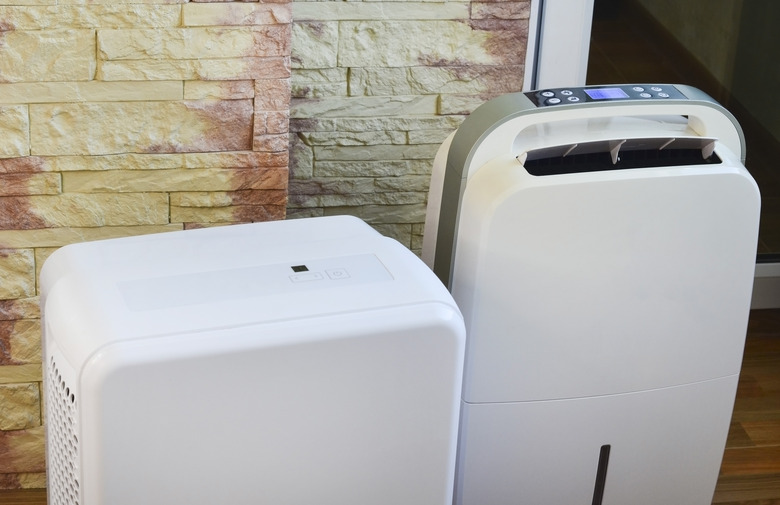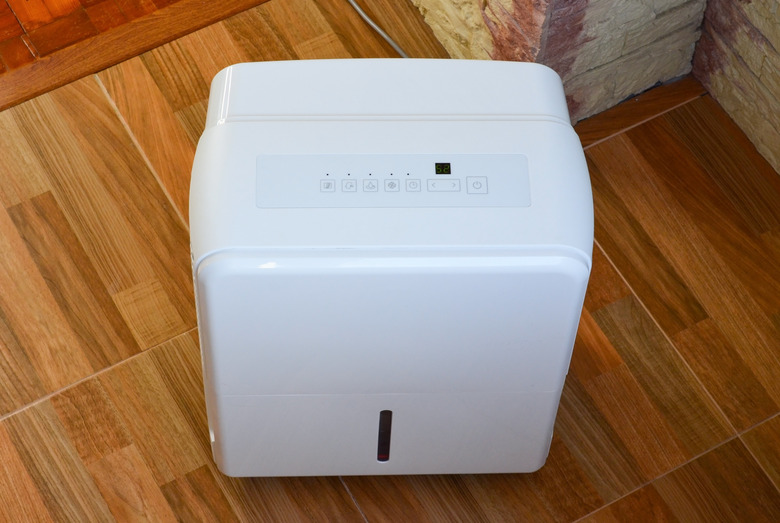How To Dispose Of Dehumidifiers
Depending on where you live, dehumidifiers are all about making life more comfortable at home. When the air is thicker than a sauna, extracting that humidity is crucial. Without dehumidifiers, homes in some regions are prone to mold and moisture damage in structures. These appliances make life safer, easier, and healthier for people with some health conditions, especially when humidity makes it harder to breathe deeply.However effective they are, eventually they will reach the end of their life cycle — and when they do, it can be a challenge to know how to dispose of them properly.
Disposing of dehumidifiers is heavily regulated, and you'll need to recycle your appliance, whether it's large or small. Luckily, where there are regulations, solutions for how to dispose of a dehumidifier are in place to help you unload that chemical-filled appliance safely. These rules vary by town and county, so you'll have to see which ones are in effect near you.
Dangers of Dehumidifier Disposal
Dangers of Dehumidifier Disposal
Dehumidifiers work much like air conditioners by using refrigerants to create a more pleasant indoor experience. Unlike air conditioners, dehumidifiers don't make rooms cooler, but they do remove mugginess, making the air more comfortable. To do this, they use components and gases that are bad for the planet (and people) if disposed of inappropriately.
While this includes many standard appliance materials, like copper and plastic, it also includes a refrigerant gas. Dehumidifiers manufactured before 2010 typically used a refrigerant containing hydrochlorofluorocarbons (HCFCs), greenhouse gases that deplete the ozone layer. Newer dehumidifiers typically contain hydrofluorocarbon (HFC) refrigerant, often in the form of Freon, which does not deplete the ozone layer but is a greenhouse gas. Improper disposal of a dehumidifier of any age can result in the release of greenhouse gases into the atmosphere.
If your dehumidifier has lost effectiveness or no longer works for your home, then it's time to consider recycling it. Older humidifiers often develop deposits that become breeding grounds for bacteria that then might be dispersed by the unit, which can be harmful to those inhaling it. Like most major appliances, you can expect replacement to be necessary after 10 to 12 years if not sooner.
The Best Way to Dispose of a Dehumidifier
The Best Way to Dispose of a Dehumidifier
The specifics vary when it comes to disposing of a dehumidifier safely, and that's why the best way to get started is to call your local recycling center or public works department. They should be able to answer your questions and send you in the right direction locally. If you're lucky, there may be a curbside pickup service, and all you'll need to do is get it to the end of your driveway with your other household solid waste. If it's a small dehumidifier, there are likely drop-off centers or waste haulers that can take it off your hands. If it's a large whole-house dehumidifier, safely unloading it may take more effort. And depending on the type of dehumidifier you have, you may need to drop it off at a hazardous waste facility.
Do not start dismantling your dehumidifier in hopes of simplifying your efforts. Refrigerants in some appliances may be illegal for anyone to remove if they're not EPA-certified professionals. Some larger appliances can require expertise for safe removal, and it's often why recycling refrigerant-containing appliances can come with a nominal fee.
If your local recycling center is at a loss for where to take your old dehumidifier, then the Environmental Protection Agency's Responsible Appliance Disposal Program (RAD) might have partners in your area. Its site isn't great for doing local searches, but a general web search for "responsible appliance disposal near me" should come up with both municipal recycling or disposal programs and private companies that offer their services for a small fee. The type of programs available will vary from place to place.
Other Ways to Dispose of Dehumidifiers
Other Ways to Dispose of Dehumidifiers
Despite the EPA's RAD program being national, fewer than half of U.S. states offer affiliated programs. If your web search comes up with private companies as your only local solutions, they may be better priced than you imagine. Private companies often collect such appliances for a reasonable fee because they're able to recycle their various parts for profit. Retailers often offer these programs too, so you may find a solution quickly by calling the business from which you originally purchased it.
If your dehumidifier still works and you're looking to upgrade, there may be "bounty programs" in your state that will allow you to efficiently dispose of the appliance while getting a rebate or credit for off-loading it. Then again, if it's functioning and it's just a question of being the wrong size of dehumidifier for you, consider donating it so it can be used or sold for profit to benefit a charity. If it's in okay shape, another person can reuse it; otherwise, it can be sold for parts and scrap metal. Habitat for Humanity's ReStore is a great place for appliance donations, and you might even find a gently used dehumidifier there that's more appropriate for your square footage. Consider churches, thrift stores, and other organizations (think Salvation Army or Goodwill), some of which will come to you for appliance pickup free of charge.
Legal Considerations for Disposing of Dehumidifiers
Legal Considerations for Disposing of Dehumidifiers
In an era of climate change, regulations exist for disposing of all appliances that contain refrigerants and for disposing of them irresponsibly because the chemical is considered household hazardous waste. There are consequences for throwing your dehumidifier, air conditioner, or other HVAC equipment in a dumpster or elsewhere to end up in a landfill. According to Section 608 of the Clean Air Act, the EPA can levy fines of up to $37,500 per day that refrigerants are illegally released, but the heftiest fines tend to be commercially imposed. For serial infractions, jail time is possible. Municipal regulations will have their own consequences, and it's best not to learn the consequences the hard way.
While you are unlikely to meet the most severe repercussions that are generally levied on companies, pleading ignorance isn't a legal defense. But as daunting as the prospect of getting rid of your appliance may seem, the odds are good that there's a simpler solution than you might think. Even having your dehumidifier hauled away by a company is likely to be more affordable than you suspect.
While you're seeking disposal answers in your municipality, don't hesitate to ask your social networks, too. Odds are, someone has already been down that road and can save you some legwork on your journey to responsible appliance disposal.

